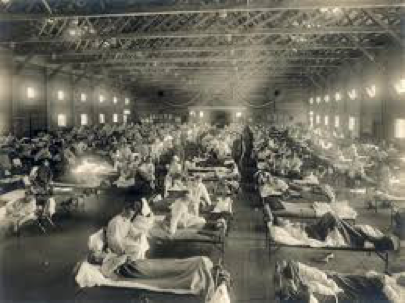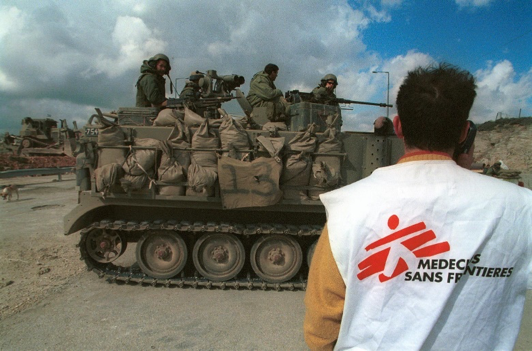The Global Impact of the Coronavirus on Conflict: A Missed Opportunity?
- The Eyes Journal

- Jun 18, 2020
- 4 min read
The Coronavirus has dominated public discourse to such an extent in the past 4 months that it is becoming increasingly common to see other issues or topics referred to with viral terminology in an attempt to drag attention away from the pandemic. This is happening with the race protests, as racism is described as a virus, and with recent claims by politicians to ‘stop the spread’ of unemployment. One global issue that is often referred to with pandemic-like terminology is war, as it spreads across borders like a contagion, infecting the minds of impressionable young fighters. There are clear historical reasons for the association between conflict and pandemics.

Arguably the most famous case of a pandemic and war is that of the 1918-19 influenza outbreak, generally referred to as Spanish Flu (unfairly, as it neither originated nor was particularly prominent in Spain), but which was spread by millions of troops returning from viral hot-spots on the Western Front to unleash the disease on their unsuspecting home communities. During the ‘100 Years War’ (another misnomer considering the series of conflicts lasted 115 years), outbreaks of the black plague caused such considerable casualties as to actually change the momentum of the conflict. Clearly the combination of conflict and pandemics can be monumental.
Generally, however, the link between conflict and disease is less conspicuous, although equally tragic, as conflict-zones remove the possibility for appropriate medical treatment and foster ideal conditions for the spread of infectious disease. It therefore came as no surprise that, as the extent of the current pandemic became apparent, and the ability of governments to contain it was questioned, world leaders began a call for fighters in conflicts all over the globe to lay down their weapons, and ‘focus together on the true fight of our lives’, as UN Secretary General Guterres said on March 23rd. A similar call came from Pope Francis a week later. The true enemy was the virus, we were told. War could wait.
Surprisingly, people listened. By the first weeks of April, fighters in up to 14 countries had declared temporary cease-fires, and negotiations began to make these cease-fires permanent. There are several reasons fighters chose to lay down their arms. One is public support, which guerrilla factions depend upon, and is something that would have suffered if fighters were seen to prioritise their own struggle whilst ignoring the global issue facing us all. ‘We are all in this together’ has been repeated ad nauseam throughout the pandemic, and to actively disregard this would have played very poorly.
Opportunistic behaviour is another factor. Some insurgent groups that put cease-fires in place have been rumbling along for over 50 years, for example the ELN in Colombia and the NPA in Indonesia. It does not seem unreasonable to assume that the chance to regroup and reassess was a welcome one. There is a notion in diplomacy known as ‘Ripeness Theory’ that suggests two parties will only find common ground and reach an agreement after long periods of impasse when the timing is perfect: perhaps the pandemic was this moment?
It is worth considering the necessity of a conflict if it can be called-off due to outside circumstances. Without downplaying the significance of the pandemic, the idea of fighting for a truly just cause is brought into question if it can simply be halted. There would have been no question of a cease-fire during the Second World War, for example, or in any profound ideological conflict. Perhaps the willingness of certain forces to lay down their weapons will enable those making decisions to recognise the general futility of armed struggle and resort instead to dialogue and communication, although this feels optimistic. The Prussian general and statesman Clausewitz described war as ‘politics continued by other means;’ perhaps it is time to try politics again. More likely, however, is that a willingness to halt fighting will be seen as a lack of commitment to a cause, and could damage credibility.
Sadly, it seems that the early optimism around the impact of the coronavirus was misplaced. As time went on, it became clear that any momentum that existed within this rare moment of international unity was short-lived as countries began to turn on each other, bizarre claims about the origin and design of the coronavirus surfaced, and fragile cease-fire agreements began to crumble. In many regards, relationships between nation-states are worse than they were at the start of the year.

Various claims have been made to justify the continuation of wars, or the restarting of violence. To generalise slightly, it seems the issues that cause conflict have not been impacted by the pandemic. Indeed, in several cases, they have been exacerbated, as gaps in society have become more apparent and discourse more politicised. It is unlikely that many will consider this as a huge opportunity missed, considering the pandemic itself prevented the type of traditional diplomacy between leaders that is generally seen as a requirement in securing lasting peace, as well as more experimental community-led methods. If two warring generals are unable to meet to discuss terms and conditions due to social distancing measures, it is unlikely they are going to be able to arrange a cease-fire.
The coronavirus pandemic has been a trying time for so many people, that the chances of it causing long-term peace processes were always slim. Indeed, recent civil unrest has demonstrated that if anything, divides that existed in society before the pandemic have simply been made starker. Unlike so many historical counterpoints, it seems that Covid-19 is not destined to greatly influence any major conflicts. The ways it has influenced society as a whole will be dissected in the months and years that follow.
![2[1].jpg](https://static.wixstatic.com/media/5abadf_f310244424a443b29215dadb17bba49b~mv2.jpg/v1/crop/x_5,y_0,w_1069,h_1080/fill/w_101,h_102,al_c,q_80,usm_0.66_1.00_0.01,enc_avif,quality_auto/2%5B1%5D.jpg)






Comments